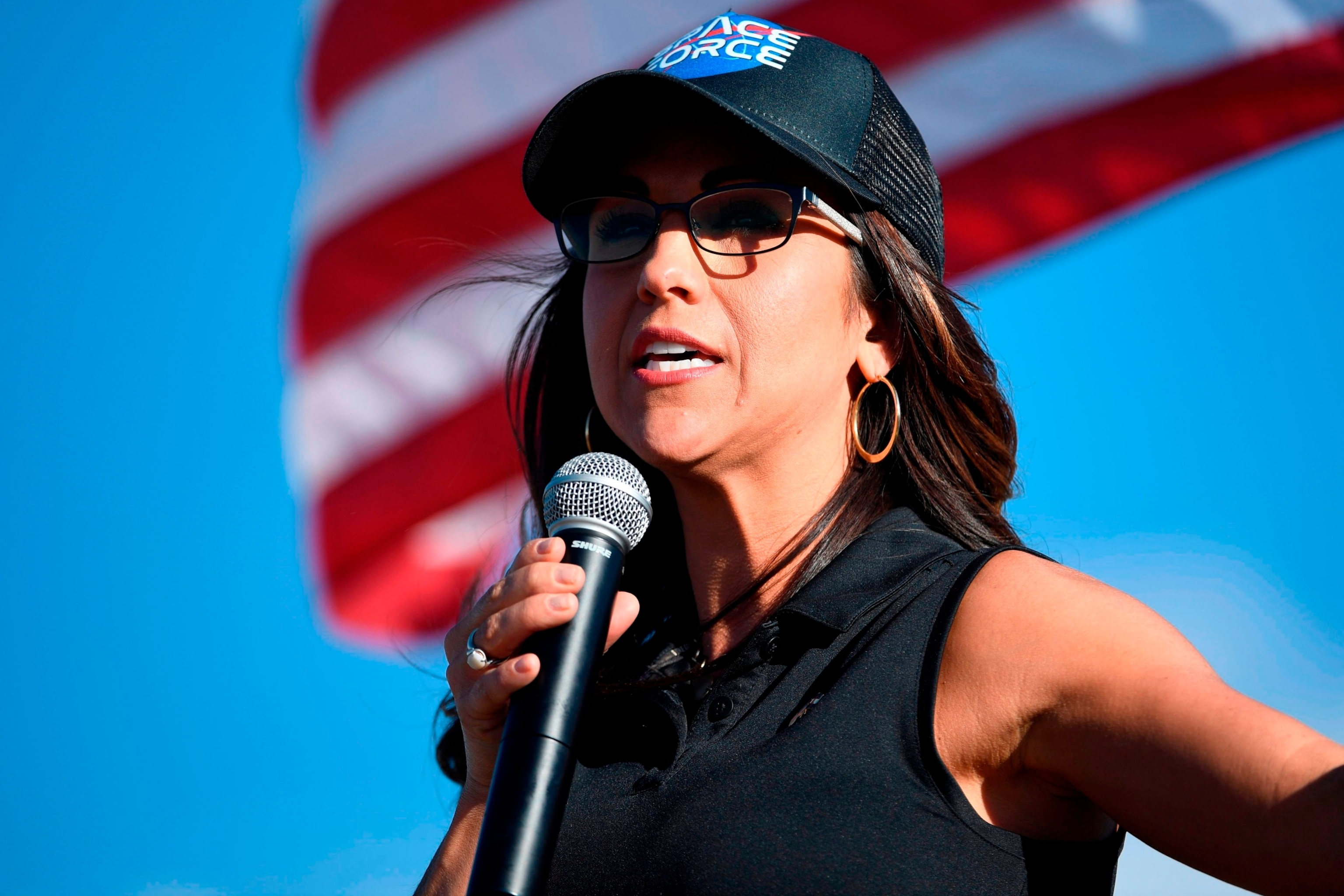Don’t write off Lauren Boebert just yet
After a terrible year, she's one win away from a House seat for life.
A thin trickle of sweat slid from Beto O'Rourke's temple down his cheek. It was a warm, sunny afternoon in 2019 in Aurora, Colorado, and the then-presidential candidate stood on the steps of city hall talking to voters about gun control. As the crowd shared stories and fears about the state of gun culture in the U.S., O'Rourke pledged to pursue aggressive gun control measures. Then a petite woman in the front row was handed the mic.
"My name is Lauren and I drove down here from Rifle, Colorado, to speak with you today," she said. "I was one of the gun-owning Americans that heard your speech and heard what you had to say regarding, 'Hell yes, we're going to take your AR-15s and your AK-47s,'" she continued, referring to a response O'Rourke had given during a Democratic presidential debate just days earlier.
Some in the crowd began to cheer and shout "Hell yeah!," but O'Rourke asked them to "be respectful." Suddenly, the woman seemed to tap into deeper confidence: "Well, I am here to say, 'Hell no. You're not.'"
O'Rourke, of course, did not go on to win his election, but the woman — a 32-year-old, gun-themed restaurant owner named Lauren Boebert — did. At the time, Boebert was not yet running for Congress. But after her confrontation with O'Rourke went semi-viral among the right, landing her an appearance on Fox News and headlines in the National Review, Boebert decided to challenge incumbent Republican Rep. Scott Tipton in her home district, Colorado's 3rd. Her 55-percent-to-45-percent victory in the Republican primary on June 30, 2020, was one of the biggest shocks of the cycle.
The moment with O'Rourke that launched Boebert's political career is striking because it captures so much of what voters liked about the congresswoman during that first campaign. She was ballsy, a small business owner with no political experience, and attuned to the issues that people in her community were talking about. But today, two terms in, many of her former supporters feel she's become a D.C. insider who's out of touch with the district and whose ballsiness looks more like impertinence.
Now, after nearly losing her seat in 2022 and surviving an objectively awful year in her personal life, Boebert is starting over on the other side of the state. Running in the 4th Congressional District in Colorado's Eastern Plains, she's hoping to reignite some of that early appeal in the state's most conservative district — where, if she can win over enough voters in the June primary, she'll be virtually guaranteed a seat in Congress as long as she wants it. There are a number of things working in her favor — name recognition, a crowded primary and a healthy war chest — but will they be enough for Boebert to inspire the same kind of support she had when she was just Lauren from Rifle?

When Boebert first decided to run for office in late 2019, many doubted that a little-known, Trumpy millennial stood much of a chance against a five-term incumbent.
Though Boebert enjoyed some name recognition from owning Shooters Grill — a gun-themed restaurant that attracted national media attention, where servers openly carried firearms — she was still at a disadvantage. Tipton had represented the district in Congress since 2011 and was a member of the state legislature before that. Boebert had no political experience, even less money — and, to top it all off, former President Donald Trump had endorsed Tipton.
But Boebert was dedicated to hitting the campaign trail, and she had a charismatic speaking style and a message that resonated. Laura Carno, a Republican political strategist who worked on Boebert's 2020 campaign, said the candidate had a tenacious work ethic: She visited every county, and drove the district end-to-end (a more than eight-hour excursion) in a single day multiple times.
"I've worked on a number of campaigns in my career, and I've never seen a candidate work as hard as she did," Carno said.
Gun rights were at the forefront of her campaign, as they were on voters' minds — the state had recalled two state senators just a few years prior for being too bullish on gun control, and Black Lives Matter protests in 2020 thrust gun violence into the national conversation. In the end, some of Boebert's perceived weaknesses actually added to her appeal, according to Kevin McCarney, who was then the GOP chair for Mesa County, the 3rd District's second-most populous county. "She resonated as someone who wasn't a politician, which was a big message at that point in time, especially after what happened with Trump," McCarney said. "And she was definitely a Trump girl."
But a lot can change in four years. Even before she got to Capitol Hill, Boebert began making national headlines, and not necessarily for reasons her constituents liked. There was her comment about hoping the QAnon conspiracy theory was real, the dispute with Capitol police over her Glock setting off metal detectors, the time she called fellow Rep. Ilhan Omar a member of the "jihad squad" (she later apologized for the remark).
To call her a controversial figure would be an understatement. She's part of a cohort of far-right obstructionists in Congress — largely from the Freedom Caucus — whose goal seems to be to make life harder for other politicians, even from their own party. She's an election denier who has made comments supportive of Christian nationalism and has sponsored or supported bills ranging from impeaching President Joe Biden for withdrawing from Afghanistan to a resolution that sought to strip a win from a transgender swimmer.

As I've written before, Colorado's 3rd District, though reliably red, doesn't look like other districts represented by Boebert's fellow hardline Republicans: It's less white, less evangelical Christian and less Republican. While she still maintained a coterie of devoted fans, each headline-grabbing stunt chipped away at her popularity back home. It wasn't that voters on the Western Slope always disapproved of her behavior (though some certainly did), but instead, they felt that it was evidence she was more interested in her own image and celebrity than in representing her constituents.
"People thought that she had — I'm gonna use the language [I've heard others use] —'gone Hollywood,' because they felt like it was more about her and her fame, as opposed to representing the district," said Carno. This was reflected in a poll of the 3rd District conducted last spring by Global Strategy Group. When asked if the description "more focused on getting attention than getting things done," matched Boebert, 55 percent of voters said that it described her "well" or "very well," and 44 percent called her "an embarrassment to Colorado."
The damage caught up to her in the 2022 midterms, when she came within a few hundred votes of losing her seat to Democratic candidate Adam Frisch. Things only got worse from there as Boebert's personal life began to unravel. She and her husband embarked on a messy divorce; she was kicked out of a performance of "Beetlejuice," the musical, for being loud, vaping and groping her date; and her 18-year-old son was arrested and charged with multiple felonies.
At the end of the year, Boebert made an announcement on Facebook. She wouldn't be running for reelection in the 3rd District, where she claimed "dark money that is directed at destroying me personally" could "steal" the seat (her spin on the six-figure Democratic attack ad campaign being lobbed against her). Instead, she moved her family to Windsor, in the state's 4th District, from which then-Rep. Ken Buck had recently announced he would be retiring. Along with concerns that staying in the 3rd District could give Democrats the opportunity to flip the seat (which went for Trump by 6 percentage points in 2020), Boebert framed the move as a "fresh start" for her and her sons after such a tumultuous year.
"I've made my own personal mistakes and have owned up and apologized for them," Boebert said. "It's been humbling and challenging, but it's also given me perspective and helped me grow."
But while the 4th District (which went for Trump by 16 points in 2020) is a safe seat for just about any Republican in the general election, Boebert still needs to get through a tough primary on June 25 before she can rest easy. Sure, she's started out with more name recognition than she did in her upstart 2020 campaign, but given all the negative headlines about her, that isn't necessarily a good thing. And she can no longer fall back on being a political outsider after two terms in D.C. or claim to be deeply connected to the district. No, this deep-red district has been skeptical of the congresswoman, at least to start.
"The red carpet was not rolled out for her in January," said Drew Sexton, a spokesperson for Boebert's campaign. Indeed, a February poll of likely Republican voters in the 4th District found 42 percent had an unfavorable view of Boebert, more than the 38 percent who had a favorable view. And of the 49 percent who said they weren't certain who they would vote for in the primary, 63 percent said it wouldn't be Boebert.
There are also five other candidates, including some current or former officeholders, vying for the nomination in the 4th District — something serious politicians typically don't dare to do against an incumbent. For instance, there's former state Sen. Jerry Sonnenberg, who also represented part of the region in the state House. Sonnenberg has been endorsed by three former senators — Cory Gardner, Wayne Allard and Hank Brown — and has plenty of local bona fides, having worked as a farmer and rancher in the region for decades. There's also Deborah Flora, a former Miss Colorado and local talk radio host who is a well-known Republican voice in the community.

But there's a lot working in Boebert's favor too. Unlike that first primary four years ago, Boebert now has a huge fundraising advantage, by a factor of 10: She's raked in close to $3.5 million compared to the $356,000 raised by the next-highest fundraiser, Flora. And this time around, she's the one with Trump's endorsement.
According to Sexton, Boebert has also held onto her hard work ethic from her first campaign; she has made 50 campaign appearances across the district already this year. "Saturday the 30th before Easter, she drove from Windsor to Elbert County for their County Assembly, kept driving to Baca County for their Lincoln Day Dinner, back up to Crowley County for their Meat-In Dinner, and then returned home to take her boys to Easter service with supporters in Yuma County," Sexton wrote in an email. "All told, that's about 1,000 miles of driving for the weekend."
Indeed, the spark she ignited on the Western Slope in 2020 seems to be rekindling on the other side of the state. In Colorado, there are two ways for candidates to get on the ballot for a primary election: either by collecting signatures or earning at least 30 percent of the vote at the district assembly (a meeting of local party organizers and devotees). Boebert managed to do both, and she even took top billing at the 4th District assembly in April. Now, the firebrand congresswoman is just one more first-place finish away from what is probably a safe House seat for life.




